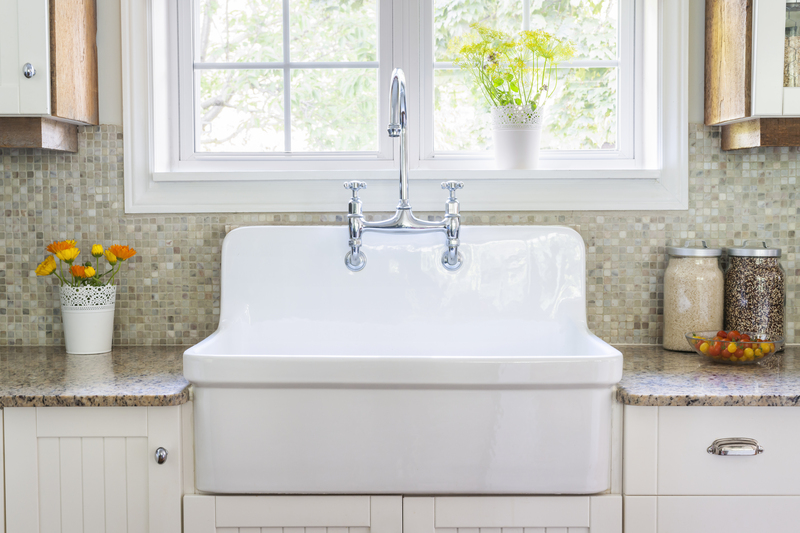Freshen Your Living Space by Tackling Damp Odor
Posted on 18/09/2025
Freshen Your Living Space by Tackling Damp Odor
Understanding the Cause of Damp Odor in Homes
Damp odor in homes is a common struggle for many. Musty, lingering smells can make your space uncomfortable and uninviting, striking an unpleasant first impression when someone enters. Whether you call it a stale scent, damp smell, or simply a humid aroma, the root causes are often the same, stemming from excess moisture in your living environment.
To effectively freshen your living space and eliminate musty odors, it's important to understand where and why these smells originate. Once you know the causes, tackling damp odor and preventing its return becomes much more manageable.
What Causes Damp Odor?
- Poor Ventilation: Stagnant air allows moisture to accumulate and foster mold growth, which leads to a musty, damp scent.
- Leaks and Water Intrusion: Faulty plumbing, roof leaks, or cracks in your building allow water to seep in, raising humidity and feeding mold spores.
- Condensation: Inadequate insulation or dramatic temperature swings create condensation on windows, walls, and pipes. This lingering moisture creates a perfect environment for damp-smelling bacteria.
- Neglected Areas: Basements, crawl spaces, and attics are notorious for damp odor since they're rarely visited or cleaned.
- Stored Items: Cardboard boxes, old carpets, and upholstery can absorb and hold onto musty, damp smells over time.
Why Should You Address Damp Smells Immediately?
Ignoring musty odors is not only unpleasant - it could be harmful. Here's why it's crucial to eliminate dampness in your living space at the source:
- Health Risks: Persistent dampness can contribute to respiratory problems, allergies, and asthma. Mold spores and bacteria thrive in wet environments and can negatively impact your immune system.
- Property Damage: Over time, moisture weakens structure, rots wood, and destroys electronics and furniture.
- Reduced Home Value: Lingering damp or musty smelly homes can scare off potential buyers and renters, reducing their value.

Effective Strategies to Remove and Prevent Damp Odor
Let's walk through practical, proven strategies to get rid of musty smells and maintain a fresh living space all year round.
1. Identify and Fix Moisture Sources
The first crucial step is identifying and repairing the source of excess moisture. Without this, damp odors will keep returning.
- Inspect for Leaks: Regularly check plumbing under sinks, behind toilets, and in the basement for signs of water leaks.
- Examine Roof and Windows: Make sure your roof isn't leaking and that windows and doors are properly sealed against rain.
- Check for Foundation Cracks: Seal any visible cracks in the basement or foundation to prevent water entry.
*By targeting these sources, you stop the cycle of moisture buildup that leads to musty odors in your home.*
2. Improve Ventilation
Proper ventilation is essential to freshen your living space and banish stale air.
- Open Windows Regularly: Create airflow to replace humid, stagnant air with fresh outdoor air.
- Use Exhaust Fans: Kitchen and bathroom exhaust fans help remove steam and reduce moisture indoors.
- Install Ventilators: In spaces prone to dampness, consider adding attic, basement, or crawl space ventilators for continuous airflow.
3. Utilize Dehumidifiers and Moisture Absorbers
Dehumidifiers and moisture absorbers are some of the most effective tools to eliminate damp smells and keep humidity in check.
- Portable Dehumidifiers: Set up in basements, laundry rooms, or any room prone to dampness to extract moisture from the air.
- Desiccants: Use silica gel packs, activated charcoal, or commercially available moisture absorbers in closets, drawers, and storage spaces.
- DIY Moisture Absorbers: A bowl of baking soda or cat litter can absorb odors and moisture in small spaces.
Finding the right humidity level is critical. Aim for indoor humidity levels between 30-50% to prevent mold and keep your home smelling fresh.
4. Clean and Disinfect Regularly
Regular cleaning is vital for banishing persistent musty odors. Focus on areas where must and mold can accumulate:
- Wash Hard Surfaces: Scrub walls, floors, and tiles with a mixture of water and vinegar or household disinfectant.
- Launder Fabrics: Curtains, upholstery covers, and throws often trap damp smells - wash or air them regularly.
- Deep Clean Carpets: Steam clean or use a carpet cleaner designed to remove deep-seated odors and kill mold spores.
Tip: Add a cup of white vinegar to the rinse cycle when washing musty linens or towels to neutralize lingering odors.
5. Remove and Treat Mold or Mildew
If you spot mold patches or mildew, act quickly:
- Wear Protective Gear: Use gloves and a mask to avoid breathing in spores.
- Apply Mold Remover: Use a solution of one part bleach to four parts water or a commercial mold cleaner. Scrub well and dry thoroughly.
- Dispose of Severe Cases: Severely infested rugs, insulation, or drywall may need removal and replacement.
For large-scale mold problems, hire a professional mold remediation service to safeguard your home's health and safety.
6. Refresh Indoor Air Naturally
A home free from damp odor doesn't have to be doused in heavy artificial fragrances. Here's how to create a naturally fresh atmosphere:
- Use Houseplants: Plants like peace lily and English ivy absorb toxins and improve air quality while adding beauty to your living room.
- DIY Air Fresheners: Simmer lemon peels or cinnamon sticks on the stove, or use essential oil diffusers to introduce natural, inviting scents.
- Sprinkle Baking Soda: Regularly treat carpets and rugs with baking soda to absorb musty odors overnight; vacuum thoroughly the next day.
7. Upgrade Soft Furnishings
Sometimes, persistent damp smell in living rooms or bedrooms clings to fabrics and soft furnishings long after the source is gone.
- Replace Old Carpets: Consider upgrading to mold-resistant flooring materials like vinyl, tile, or sealed hardwood.
- Invest in Washable Covers: Slipcovers for sofas and chairs are easier to remove and clean regularly.
- Store Smartly: Use sealable storage containers for off-season clothes and bedding to prevent them from absorbing excess moisture.
8. Inspect and Maintain HVAC Systems
HVAC systems can both help and hinder your fight against damp odors. Make sure yours is in top shape:
- Change Filters Regularly: Dirty filters trap moisture and help spread mold spores through your home.
- Clean Ducts: Have air ducts cleaned by a professional to remove any build-up of dust, mold, or mildew.
- Install UV Lights: UV purifiers in ductwork kill bacteria and mold as the air circulates, banishing musty smells.
Prevention Tips: Keeping Your Living Space Smelling Fresh
Once you have tackled your damp odor, follow these preventative tips to keep your home smelling inviting:
- Monitor Humidity: Use a hygrometer to ensure humidity stays below 50%.
- Keep Windows Open on Dry Days: Let sunshine and fresh air in to naturally dry out your space.
- Store Items Dry: Never store damp clothes, books, or papers inside - always dry thoroughly first.
- Dry Wet Areas Immediately: Mop up spills and leaks as soon as they happen to prevent them from soaking in.
- Use Scented Sachets: Lavender or cedar sachets in closets and drawers can deter musty odors while offering a pleasant aroma.
- Inspect Regularly: Walk through your home every season to check for new leaks, condensation, or odd smells.
Natural Remedies for Persistent Damp Smell
If store-bought solutions aren't for you, these natural odor eliminators offer eco-friendly alternatives:
- Vinegar: Place a bowl of distilled white vinegar in musty rooms. It acts as a natural deodorizer for several hours.
- Activated Charcoal: Charcoal has impressive odor-absorbing capabilities and is perfect for closets or cabinets.
- Baking Soda: Sprinkle generously on carpets, upholstery, or even inside shoes to capture smells.
- Lemon: Lemon juice helps wipe away mildew on tiles, walls, and refrigerator gaskets - plus, it smells refreshing.
Remember, natural solutions can freshen your living space safely and are particularly helpful for homes with kids or pets.
When to Seek Professional Help
While many cases of damp odor can be addressed with the strategies outlined here, sometimes the problem runs deeper. Seek professional assistance if you notice:
- Persistent Mold Growth: No matter how much you clean, black or green patches keep coming back.
- Unexplained Water Damage: Stains, buckling floors, or peeling paint with no apparent source of moisture.
- Widespread Odors: The musty smell returns quickly after every cleaning attempt.
- Adverse Health Effects: Symptoms like coughing, sneezing, or skin irritation appear to worsen indoors.
Mold remediation experts can locate hidden moisture sources, treat extensive mold outbreaks, and help restore a healthy indoor environment.

Conclusion: Enjoy a Fresher, Healthier Home
Living with damp odor can be frustrating, but it's far from hopeless. By understanding the root causes, acting quickly, and using a targeted, multi-step approach, you can eliminate damp and musty smells for good. Use the strategies above to freshen your living space and enjoy a clean, welcoming home every day.
*Remember, the key to keeping your home free from unpleasant odors is consistency: Control moisture, clean diligently, ventilate frequently, and deal with issues as soon as they arise. Your nose - and your health - will thank you!*
Frequently Asked Questions
Q: What is the quickest way to get rid of a musty smell in a room?
A: Open the windows for maximum airflow, use a dehumidifier, and sprinkle baking soda on soft furnishings. Clean surfaces with a vinegar solution to neutralize odors at the source.
Q: Can essential oils help freshen my living space?
A: Yes! Diffuse essential oils such as lavender, eucalyptus, or citrus to create a pleasant scent while helping mask minor residual odors.
Q: Will repainting walls eliminate damp odor?
A: Only if the underlying cause (like mold or moisture) is addressed first. Always remove dampness and treat with mold-resistant primer before painting.
Take Action Today for a Fresher Tomorrow
Eliminating damp odors isn't just about comfort - it's about health, property value, and peace of mind. Start using these freshening tips to enjoy a brighter, cleaner, and more inviting living space today!
Latest Posts
Guardians of the Air: Strategies for Enhancing Air Quality in Shared Spaces
Secrets to Keeping Your Jewellery Dazzling
Freshen Your Living Space by Tackling Damp Odor
From Cluttered to Clean: Tenant's Guide to End of Tenancy House Cleaning



